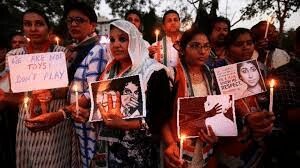
The Supreme Court on 16 November 2022 held the accused adult not to be tried as a Juvenile.
In Kathua case the Supreme Court on Wednesday has directed that the said accused Shubham Sangra should be tried as an adult. A bench containing Justice Ajay Rastogi and JB Pardiwala allowed the appeal filed by the UT of Jammu and Kashmir against order of CJM and High Court.
Case History
In this case Asifa Bano, an eight year old Muslim girl was abducted, gang raped and murdered by six men and juvenile in january 2018 in the Rasana village near Kathua in Jammu and Kashmir.The victim was belonged to nomadic community and got disappeared for a week and then found a kilometer away from the villages.Then a chargesheet was filed on the accused and they were arrested. The case was transferred by the state of Jammu and Kashmir to Punjab (Pathankot) for fair trial.
Case Trial by the District Court
In trial before the Pathankot district court Seven accused were come into existence against whom chargesheet was framed. One accused was acquitted by the trial court. Following observation and decision was taken by the court:
- Six of the seven Men accused in the case were convicted by the court.
- Three of them got life time imprisonment and three of them got 5 year imprisonment for crime.
- The court gave life imprisonment –
- The originator Sanji Ram, a retired government official and priest of the temple where the crime took place
- special police officer Deepak Khajuria
- Ram’s nephew Parvesh Kumar
- Special Police Officer Surender Verma, head constable Tilak Raj and sub-inspector Anand Dutta were awarded 5 years in prison for destroying evidence.
- The court acquitted the seventh accused (Vishal Jangotra) giving him the “benefit of doubt”.
- The crime branch filed the charge sheet against 8 persons, including a ‘juvenile’.
- The trial against the ‘juvenile’ is yet to commence, as his petition on determining his age is yet to be heard by the J&K High Court.
The J&K High Court verdict on Case
The Kathua’s CJM and the High Court of Jammu and Kashmir had held that the accused was a juvenile on the basis of dates recorded by the Executive Officer, Municipal Committee, Hiranagar in April 2004 which showed the date of birth of the accused as October 23, 2002. Appealing against the High Court order then the State takes matters to the Supreme Court.
The Verdict of Supreme Court on case

The bench of Justices Ajay Rastogi and J B Pardiwala said there were different in the certificates on record revealing the date of birth of the accused which showed him as a juvenile and hence it would rely on the medical report which stated he could have been between 19 and 23 years at the time of the incident in January 2018.
The bench concerned over the rising rate of Juvenile Delinquency in the country. Justice Said “We have started gathering an impression that the leniency with which juveniles are dealt with in the name of the goal of reformation is making them more and more emboldened in indulging in such heinous crimes.”
It is held that the respondent accused was not a juvenile at the time of commission of the offence and should be tried the way other co-accused were tried in accordance with the law. Law to take its own course.
It is needless to clarify that the guilt or the innocence of the respondent accused shall be determined strictly on the basis of the evidence that may be led by the prosecution and the defence at the time of the trial. All observations made in this judgment are meant only for the purpose of deciding the issue of juvenility.












